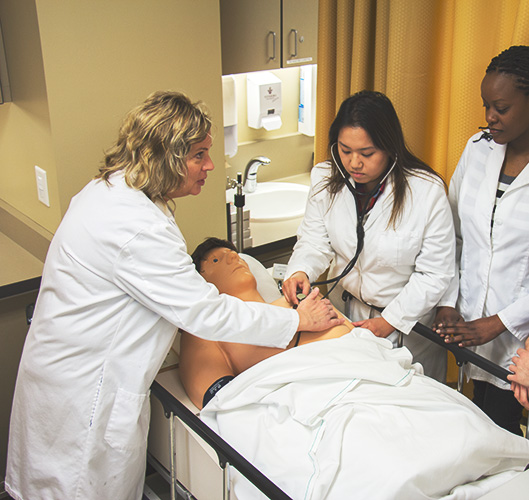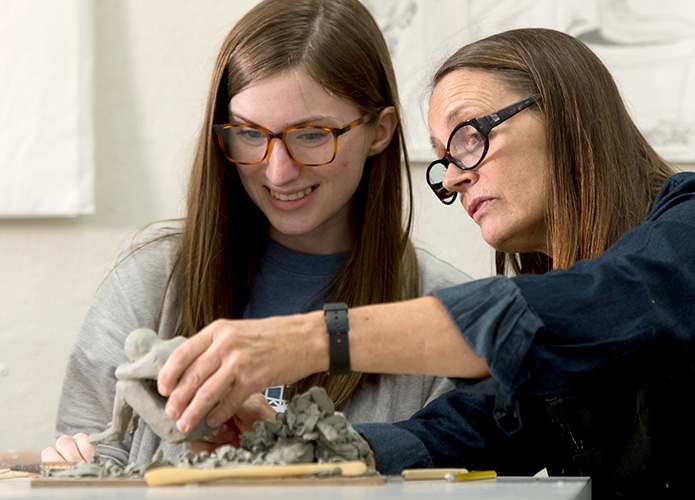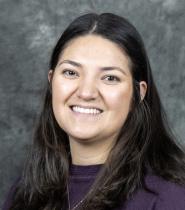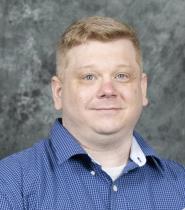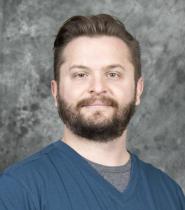Advance Your Nursing Career at Viterbo University
Viterbo University’s Doctor of Nursing Practice programs and Post-Graduate Certificate program prepare nursing leaders who are dedicated to improving the health outcomes of diverse populations through advanced knowledge and skills.
Our post-BSN/post-master’s/post-graduate certificate and DNP program serves Wisconsin, Southeastern Minnesota, Northeastern Iowa, and beyond. We prepare you to:
- Practice in an expanded, specialized, and/or advanced practice role
- Affirm the dignity of life and human diversity
- Advocate for quality outcomes for individuals, families, populations, and systems
- Demonstrate ethical leadership and faithful service in your chosen role and setting
- Facilitate the translation of research and evidence into practice
- Utilize information and health care technology to impact best practice
- Pass certification exams: 100% of our NP/DNP track students have passed their national certification exams
The curriculum of our post-BSN/post-master’s/post-graduate certificate and DNP programs was developed to meet the needs of advanced nursing professionals. Core competencies include:
- Informatics and health care technologies
- Quality improvement and safety
- Organizational and systems leadership
- Interprofessional collaboration for improving patient/population outcomes
- Advocacy
- Advanced scientific and humanities-based background for practice
Our graduate nursing program is accredited through the Commission on Collegiate Nursing Education (CCNE).
Highlights of Our Graduate Certificate and DNP Programs
We created our post-BSN/post-master’s/post-graduate certificates and Doctor of Nursing Practice (DNP) program in Wisconsin with working professionals and commuter students in mind. Classes are delivered in a hybrid online/on-campus method to help you navigate your personal, professional, and educational life. Plans of study and in-person class dates are scheduled to optimize your days on campus.
Other benefits of our DNP and post-graduate certificates include:
- Facilities. The nursing building contains friendly, learner-centered spaces, including a dedicated graduate resource room. Students in our graduate certificate and DNP programs in Wisconsin can utilize our Simulation Learning Center, a state-of-the-art facility where you will have access to the technology and equipment you need to improve your clinical skills.
- Faculty. Our approachable, student-centered faculty are well prepared in their respective nursing and teaching roles. Many are practicing nurse practitioners who are engaged in research, clinical practice, and national conferences. Clinical expertise includes primary care, occupational health, specialty practice, and acute care. They are dedicated to helping you succeed.
- Personal attention. You will be assigned an academic advisor who will help you register for courses and provide guidance throughout the program. Because we offer small classes, you will form close relationships with your faculty and peers, some of which may last beyond graduate school.
Nurse Practitioner Clinical Education Proram
We are among a small number of select regional nurse practitioner academic programs collaborating with Mayo Clinic to increase the number of nurse practitioner students and develop common clinical education curriculum and timelines.
If you are selected to participate in this prestigious program, you will be guaranteed placement for all required clinical rotations at Mayo Midwest sites.
DNP and Certification Programs
We have several programs to help you become a leader in an advanced practice role or help you specialize. These include:
Doctor of Nursing Practice
Our Doctor of Nursing Practice is designed to be relevant and responsive to the needs of practicing professional nurses who wish to formally advance their knowledge and skills and seek an advanced nursing role. The curriculum is based upon AACN recommendations and includes increased knowledge in:
- Informatics and health care technologies
- Quality improvement and safety
- Organizational and systems leadership
- Interprofessional collaboration for improving patient/population outcomes
- Advocacy
- An advanced scientific and humanities-based background for practice
MBA/DNP Dual Degree
If you already hold a BSN or MSN degree, our MBA/DNP dual degree prepares you for leadership roles, to educate future nurses, and to influence systems of care. This integrated dual degree program provides registered nurses a direct path to their career goals with critical business and management skills needed for successful health care leaders. Save time and money with this integrated program.
CRNA/DNP
For those with a BSN applying to the DNP program, you need:
- at least a bachelor’s degree in nursing from an accredited school.
- a GPA of 3.0 or higher.
- to have 18 months (24 months preferred), at an FTE of at least 0.75, of nursing experience in critical care or intensive care setting, such as ICU, CCU, SICU, PICU, NICU
Franciscan Healthcare School of Anesthesia
Adult-Gero Acute Care Nurse Practitioner Post-Graduate Certificate
If you are a post-master’s or DNP accredited primary care nurse practitioner with a family or adult-gerontology population focus, the Adult-Gero Acute Care Nurse Practitioner Post-Graduate Certificate is built for you.
The eight-course (21 credit hours) program is spread across five semesters and includes two semesters of didactic coursework and three semesters (540 hours) of clinical experiences. Clinical opportunities may be available in your region. The program is financial-aid (student-loan) eligible, with competitive scholarships available for post-graduate certificate students. The application is available after the first semester.
Other post-bachelor’s and post-master’s options include:
Nurse Practitioner/DNP
- Adult-Gerontology Acute Care Nurse Practitioner (Acute Care)
- Adult-Gerontology Nurse Practitioner (Primary Care)
- Family Nurse Practitioner (Primary Care)
Upon completion, you will be eligible to apply for either the AANP, ANCC, or AACN certification exams.
For students who already hold an MSN, the post-master’s DNP offers the flexibility of a slower pace, if that better supports balance in your life.
DNP in Ethical Leadership
- Ethical Leadership (Leadership)
DNP and Certification Program Prerequisites
For those with a BSN applying to the DNP program, you need:
- At least a bachelor’s degree in nursing from an accredited school
- A GPA of 3.0 or higher
- Two years of nursing experience at the time you would start the program
The Adult-Gero Acute Care Nurse Practitioner Post-Graduate Certificate requires an MSN and experience working as a nurse practitioner in primary care adult gerontology or family practice.
What Can You Do With a DNP or Post-Graduate Certificate?
Having a DNP allows individuals to expand their nursing career to become an advanced practice nurse (e.g., nurse practitioner, certified nurse anesthetist, certified nurse midwife, or clinical nurse specialist), obtaining leadership roles (e.g., nurse manager, nurse administrator, health care executive, or chief nursing officer), to academia (e.g., teaching undergraduate/graduate level nursing programs). All DNP graduates can be leaders within their organizations and communities through policy and advocacy and engaging in quality improvement and research to impact patient and population healthcare outcomes.
For those in a nurse practitioner (NP) track, you could work as an NP. Our NP tracks prepare individuals to work as family nurse practitioners, adult-gerontology nurse practitioners, and adult-gerontology acute care nurse practitioners (either initial preparation or through our post-graduate certificate program).
For nurse practitioners and certified nurse anesthetists, salary and job outlook varies based on location, title, and specialization, but the U.S. Bureau of Labor Statistics estimates an annual average salary of $129,480 per year with a 40% job growth (much faster than the average).
Regardless of program track, our DNP and certification graduates go on to work at:
- Gundersen Health System
- Mayo Clinic/Mayo Clinic Health Systems
- Vernon Memorial
- Tomah Health
- Other health care organizations across the country
The job placement rate for our graduate nursing program alumni is 100%.
DNP and Certification Financial Aid
Students are eligible for Federal Financial Aid, and we encourage you to seek external funding through employer tuition reimbursement, community and professional organization scholarships, and loan forgiveness programs. Scholarships offered to graduate nursing students include:
- Adult-Gero Acute Care Nurse Practitioner Post-Graduate Certificate scholarship (a limited number remain)
- Beres Family Nurse Practitioner Scholarship
- Sister Grace Clare Benzouz Endowed Scholarship
- Bonnie Nesbitt Scholarship
Funding may also be available for those interested in becoming a nurse educator in Wisconsin through the Wisconsin Nurse Educator program.
Popular DNP and Certification Experiences
Our post-master’s/post-graduate certificates and DNP programs offer you experiential learning opportunities to advance your knowledge and skills. Program highlights include:
- Nursing Research on the Green: During the spring semester DNP scholarly projects are showcased at the Nursing Research on the Green day. All DNP students can both present and see the research of their peers. Many students have also published their DNP work following completion of the project.
- Medical mission trip to Guatemala
Related Programs at Viterbo University
Viterbo offers a number of other programs that may appeal to RNs looking to advance their career. These include:


